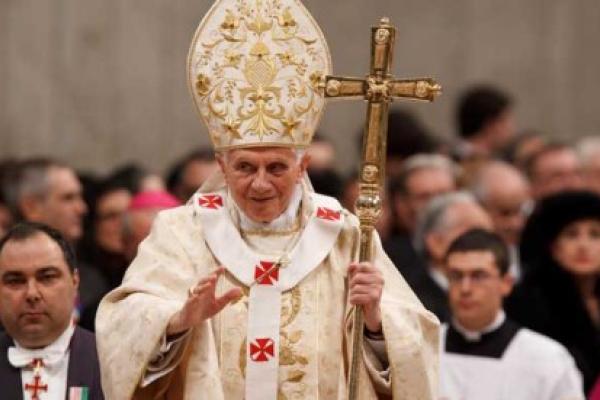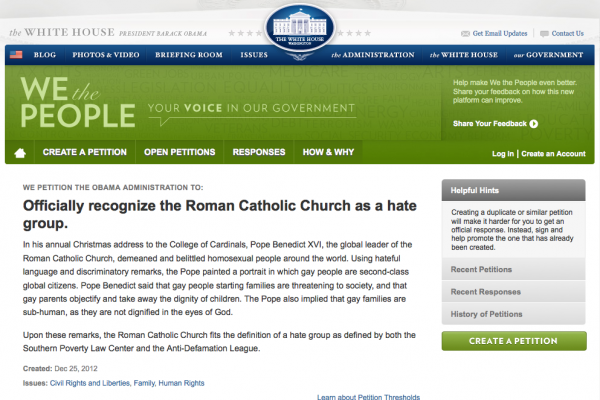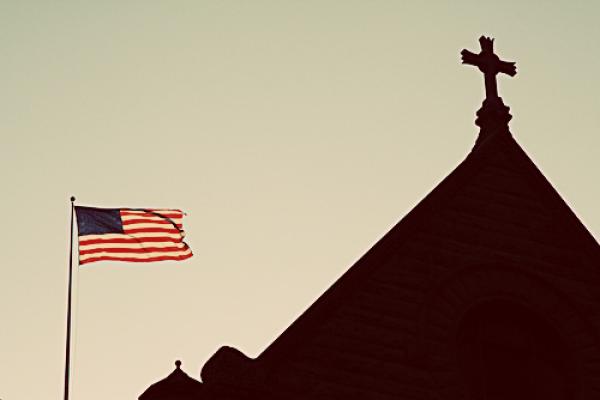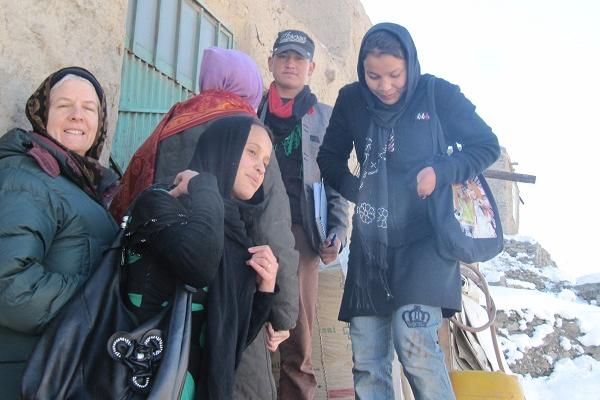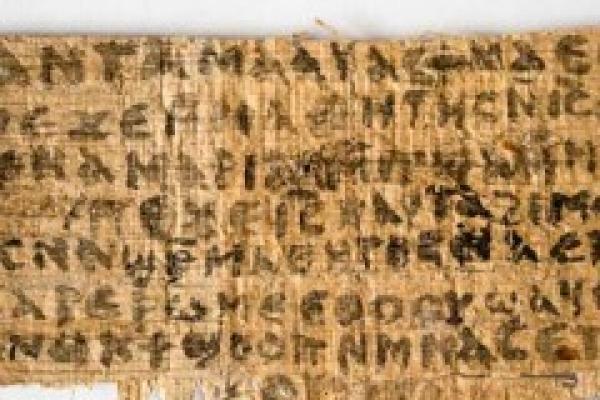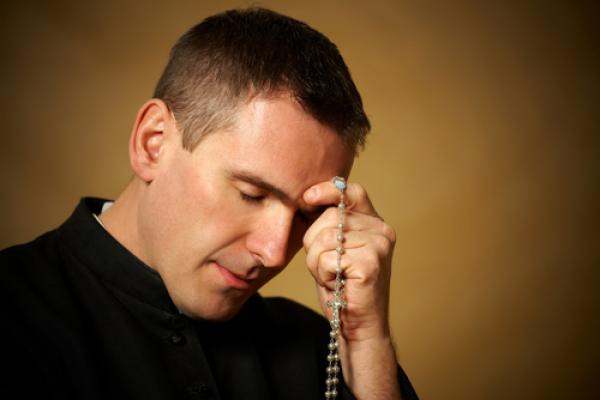VATICAN CITY — The Vatican reaffirmed its commitment to dialogue with Jews on Monday after the head of a traditionalist breakaway group called them “enemies of the Church.”
The Vatican chief spokesman, the Rev. Federico Lombardi, said that it was “meaningless” and “unacceptable” to label Jews as “enemies” of the Catholic Church.
“Both Pope Benedict XVI and his predecessor John Paul II personally engaged in dialogue with Jews,” he said. As a sign of their commitment, Lombardi noted the two popes’ visits to Jerusalem’s Western Wall, Judaism’s most sacred site, and to synagogues in Rome and elsewhere.
The White House’s novel online system for allowing citizens to petition the administration on any number of causes has led to various unintended consequences: petitions to secede from the U.S. following President Obama’s re-election; a petition for Vice President Joe Biden to star in a reality show; and a petition for the government to disclose its secret archives on extraterrestrials.
Now there is a petition to designate the Roman Catholic Church as a hate group for its opposition to gay rights, and it may wind up generating almost as many press releases as signatures.
The “We the People” petition was filed on Christmas Day and was prompted by Pope Benedict XVI’s Dec. 21 year-end address to Vatican administrators in which he denounced gay marriage as a threat to Western civilization.
Today in 1894, Thomas Edison made the first copyrighted film. It looks super hipster. Come on, Thomas. [via GOOD]
Betty White painting the IKEA monkey? Take a look at the restoration process of a painting that bares a striking resemblance to the now famous meme. and tune in to "Hot In Cleveland" on Wednesday, Jan. 9 at 10 p.m. EST on TV Land.[via Huffington Post]
The Internet is good for a lot of things, and a GoPro camera on a trombone is one of those things.
The National Geographic Photo Contest winners are in, and there are some pretty cool photos. [via Laughing Squid]
It's the little things in life that keep us going. And for Aleksander Gamme, Norwegian Explorer, finding some Cheez Doodles he placed in a pit stop on a trek in Antarctica made a huge difference. Keep on keepin' on, Aleksander. [via Huffington Post]
Despite a deep drop in the number of Americans who identify with a particular faith, the country could be on the cusp of a religious renaissance, says Frank Newport, editor-in-chief of The Gallup Poll.
Grounded in more than a million Gallup interviews, Newport's new book, God is Alive and Well, argues that the aging of the baby boomers, the influx of Hispanic immigrants and the links between religion and health could portend a bright future for faith in America.
This interview has been edited for length and clarity.
Kabul —Yesterday, four young Afghan Peace Volunteer members, Zainab, Umalbanin, Abdulhai, and Ali, guided Martha and me along narrow, primitive roads and crumbling stairs, ascending a mountain slope on the outskirts of Kabul. The icy, rutted roads twisted and turned. I asked if we could pause as my heart was hammering and I needed to catch my breath. Looking down, we saw a breathtaking view of Kabul. Above us, women in bright clothing were navigating the treacherous roads with heavy water containers on their heads or shoulders. I marveled at their strength and tenacity. “Yes, they make this trip every morning,” Umalbanin said, as she helped me regain my balance after I had slipped on the ice.
About 10 minutes later, we arrived at the home of Khoreb, a widow who helped us realize why so many widows and orphans live in the highest ranges of the mountain. Landlords rent one-room homes at the cheapest rates when they are at this isolating height; many of the homes are poorly constructed and have no pipes for running water. This means the occupants, most often women, must fetch water from the bottom of the hill each and every morning. A year ago, piped water began to reach some of the homes, but that only meant the landlords charged higher rent, so women had to move higher up the mountain for housing they can afford. It only made their daily water-carrying longer and more arduous.
The Harvard Theological Review is postponing publication of a major article on the papyrus fragment in which Jesus seems to refer to his wife, raising further doubts about a discovery that was set to turn Christian history on its head when it was announced last September.
The article by Harvard Divinity School professor Karen King was scheduled for the review’s January edition. It was expected to provide answers to questions that had been raised about the relic’s authenticity soon after King announced the discovery to select national media and at an international conference of biblical scholars in Rome.
King told CNN, which reported the latest development on Jan. 3, that the article has been delayed because testing on the fragment is not complete.
There will be, I assume, a thousand different ways to dismantle what it is that I am about to say. I get that. I respect it. I invite it. This is a conversation that we need to have and, thankfully, are having at a national level. That said, sometimes I wish we still lived in a time when talking about one's faith in public was considered inappropriate or rude. Sometimes, that is. Only sometimes.
Lillian Daniel has a new book coming out. I'll refrain from sharing my opinion about the book until after I have read it. You can read Robert Cornwall's review here. The book is entitled WHEN "SPIRITUAL BUT NOT RELIGIOUS" IS NOT ENOUGH: Seeing God in Surprising Places, Even the Church. There are some handy quick reviews on the amazon.com page. My favorite is from Shane Claiborne.
Lillian is as fed up with bad religion as anyone else, but she's also careful to celebrate good religion and good spirituality that brings people to life and makes the world a better place. May her book invite us to stop complaining about the Church we've experienced and work on becoming the Church we dream of.
CANTERBURY, England — The Church of England on Jan. 4 confirmed that it has dropped its prohibition on gay clergy in civil partnerships becoming bishops — but only if they agree to remain celibate.
Speaking on behalf of the Church’s House of Bishops, Bishop of Norwich Graham Jones said in a statement: “The House of Bishops has confirmed that clergy in civil partnerships, and living in accordance with the teaching of the Church on human sexuality, can be considered as candidates for the episcopate. There had been a moratorium on such candidates for the past year and a half while the working party completed its task.”
Jones added that the bishops agreed it would be “unjust” to exclude gay men from becoming bishops if they were otherwise “seeking to live fully in conformity with the Church’s teaching on sexual ethics or other areas of personal life and discipline.”
